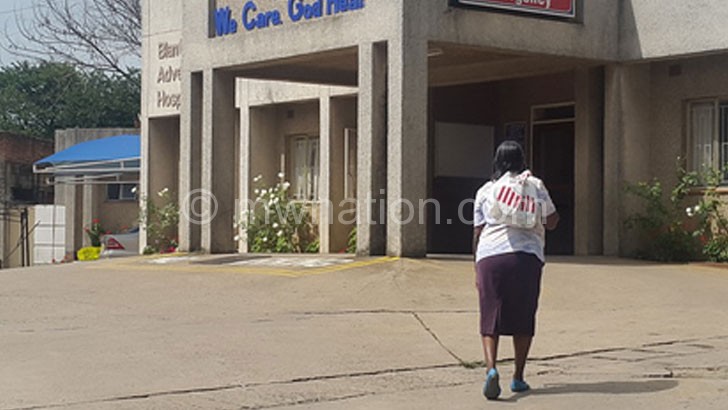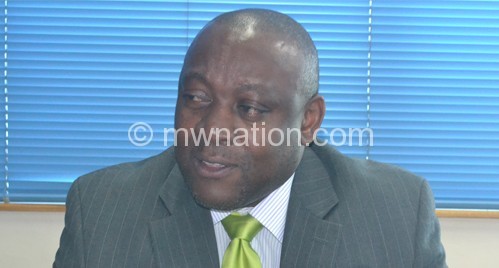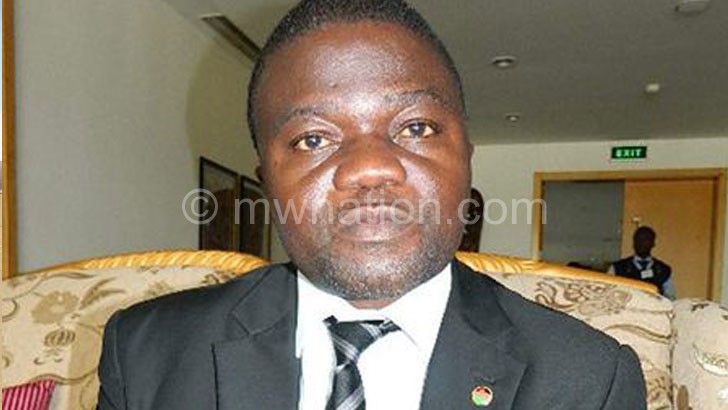No one is safe
Anger and fear spread nationwide yesterday after Blantyre Adventist Hospital (BAH) refused to treat patients covered by health insurance companies protesting the hospital’s new tariffs they consider too high.
BAH—one of the country’s major private referral health facilities—on Monday suspended its credit provision after disagreeing on medical bills with health insurance providers, which mostly cover salaried people and those considered well-off.
The move sparked fears—as monitored on social media and interviews with people—of similar tough stances from other private hospitals as the economy tanks and the kwacha heads south in a country that imports most of its drugs and medical equipment; whose sharply rising prices hospitals maybe struggling to cope with.

The credit suspension came into effect on Monday, February 1 2016, after BAH management and representatives from the insurance service providers failed to reach an agreement during a meeting they held at BAH complex last Friday.
The credit arrangement entails that private hospitals provide health services to members of insurance schemes and claim the payments later.
That arrangement is no longer available at BAH, leaving members of major health insurance service providers to pay cash at the hospital and claim from the firms themselves.
The medical insurance providers—which include Metropolitan Health, Horizon Health, Liberty Health and Medical Aid Society of Malawi (Masm) that hold more than 80 percent of the country’s private health insurance market—argue that they cannot sustain their members’ benefits basing on BAH’s newly adjusted tariffs.
In a joint statement issued yesterday, the four medical insurance providers advised its members to start paying cash when accessing services at BAH, which will be reimbursed to them by their respective medical insurers upon claiming.
However, despite the credit facility suspension, members of the medical insurance providers will still access the usual scheme benefits at other service providers on normal scheme terms.

inconveniencing
Reads part of the statement: “The members are, however, being informed that services can be accessed at BAH on cash basis and submit claims to their respective medical insurer who shall reimburse these under the normal terms and conditions of their respective schemes.”
What could be problematic for members is the wording of reimbursing under “the normal terms and conditions” because they do not explain the levels of shortfall that patients will have to bear.
However, the medical insurers have assured their members that negotiations with BAH will continue and completed within shortest possible time to protect the insured.
A source at one of the insurance providers confided in The Nation yesterday the crisis followed the introduction of “unjustifiable adjustment of tariffs” by BAH.
“The hospital gave all insurance providers a new contract which they wanted to operate at 100 percent; meaning the insurers must be paying for everything and recover the money from their members and that is not possible to sustain the members’ benefits,” she explained.
During a visit to BAH yesterday afternoon, The Nation witnessed scores of patients seeking medical help being sent back by the front desk personnel. But business generally remained normal.
One shocked patient who was denied medical assistance for being on a Horizon Health scheme complained to The Nation that the development has put their lives at risk because not every patient has steady cash to pay for services at the facility.

Blame Game
During separate interviews yesterday, each of the parties tried to justify their positions even as patients writhed in pain.
BAH director Kirby Kasinja said they came up with the decision due to a number of factors, ranging from issues of tariffs which he claimed the service providers were refusing to revise, and were also rejecting review of the relationship contract.
“There are certain things which are hurting us and to mitigate the risks, we came up with a new contract which we wanted them to agree to, otherwise what is happening is making us lose a lot of money. They owe us huge amounts of money and we feel if we cannot clear that and also clear the source of the problem then we will be heavily hurt.
“We engaged them long time ago, but unfortunately we thought we allowed for enough time to discuss the issue because we started in September and they only came on Thursday and ganged up as a group and we said that was not the way to do things.”
Unconfirmed reports indicate that medical insurance providers are failing to settle over K1 billion ($1.4 million) owed to BAH.
The development also comes barely days after Masm adjusted its rates effective January 1 2016, arguing the decision was made to ensure sustainability of the society’s activities in view of the country’s economic trends.
In an interview, Masm chief executive officer Sydney Chikoti and Metropolitan Health managing director Bright Kamanga described the credit suspension as regrettable and inconveniencing to their clients.
Said Chikoti: “It is very inconveniencing to our members because they are used to getting facilities on credit; but now they are being asked to pay, which is something we have tried to avoid, but unfortunately our friends are adamant.”
On his part, Kamanga said: “It is a great inconvenience to our members who would love to patronise the hospital. It is a stalemate that has different issues and we are trying to take a worldwide approach, but we seem not to be having that from the hospital side. Unfortunately, the hospital has also been taking bookings while fully aware that that is the action they will take which was also wrong.”
However, vice-president of Medical Association of Africa Professor John Chisi backed BAH’s move, saying in an interview last evening that there was nothing wrong with suspending the credit facility due to contractual disputes with insurance providers.
“The medical schemes are agreements between the hospitals and the insurance providers and if there is misunderstanding, the contract can be terminated because facilities are not created with the intention of medical schemes, but with the intention of services to the people.
“Now when things are working, that is fine, but when one side is not behaving, then obviously they can be terminated,” said Chisi, who is also board chairperson of Medical Council of Malawi (MCM) and a medical lecturer at College of Medicine (CoM), a constituent college of the University of Malawi.
Minister of Health Peter Kumpalume declined to comment on the matter yesterday, saying: “I am two hours old in the country, I have just arrived from a meeting outside the country and I have no idea about what you are talking about, so firstly I need to find out the details and then I can react.”
The big picture
At a glance, the development may appear to involve a single hospital, with people under health insurance having options of other hospitals to turn to.
In truth, however, it is a sign that the deteriorating economy—after devastating the public health system for years—has now turned on what was considered a resilient private sector health industry where people, frustrated with lack of drugs, equipment and long queues at government hospitals, turned to.
Should the other private hospitals follow BAH’s lead, Malawi’s already gasping healthcare system could plunge into a comma given the numbers that private health service providers serve.
According to a 2011 assessment of the Malawi private health sector conducted by Strengthening Health Outcomes through the Private Sector (Shops) with support from the United States Agency for International Development (USAid), roughly 40 percent of health services are provided by private actors.
These include the Christian Health Association of Malawi (Cham), commercial providers, and other non profit actors, which Shops says are crucial for expanding access to essential health services in rural areas of Malawi.
Shop says Cham alone provides approximately 37 percent of the country’s healthcare—translating to four million Malawians annually—while the private for-profit sector offers less than three percent, but this figure is growing rapidly.
Should the non-State providers react to rising costs of running hospitals and hike fees to pass on the costs, it will not just be those under medical insurance who will suffer—it is everyone looking for healthcare that government hospitals cannot provide due to poor funding and an overworked and demotivated workforce.
And with what is increasingly looking like a currency crisis as the kwacha freely depreciates, drugs and medical equipment, the majority of which is imported, could become too costly to import—and accessed by patients.





